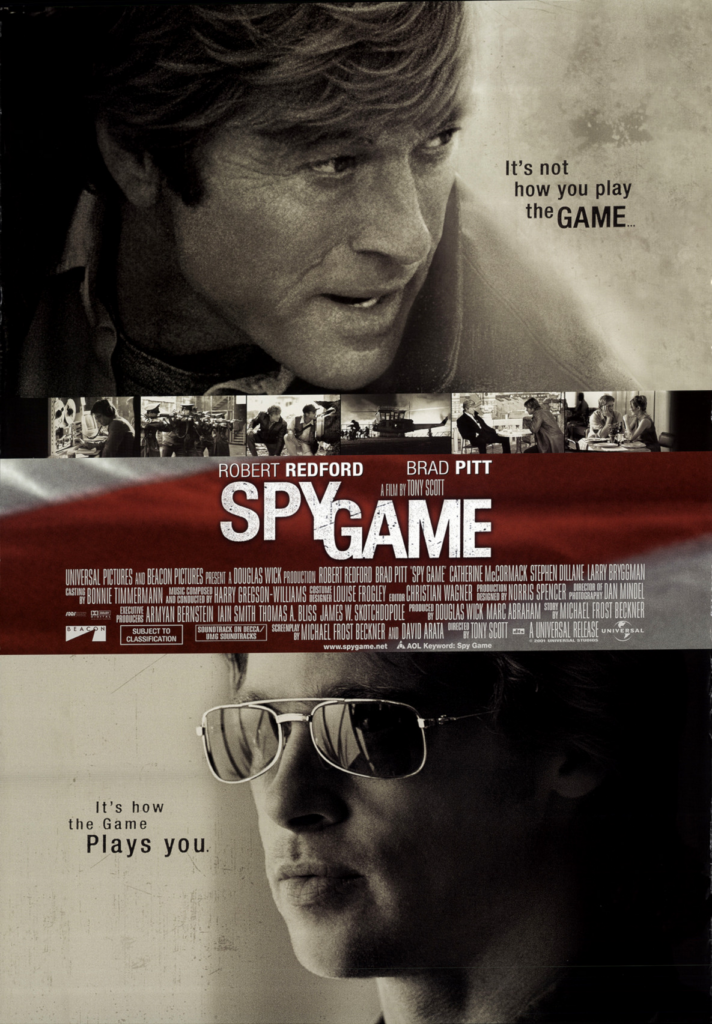
SPY GAME(director: Tony Scott; screenwriters: Michael Frost Beckner/David Arata/based on a story by Beckner; cinematographer: Dan Mindel; editor: Christian Wagner; music: Harry Gregson-Williams; cast: Robert Redford (Nathan Muir), Brad Pitt (Tom Bishop), Catherine McCormack (Elizabeth Hadley), Stephen Dillane (Charles Harker), Larry Bryggman (Troy Folger), Marianne Jean-Baptiste (Gladys); Runtime: 127; Universal; 2001)
“A formula action espionage film.”
Reviewed by Dennis Schwartz
A formula action espionage film. It weaves its story around the following cliché moments: a veteran breaks in a rookie and the rookie shows his stuff and becomes just as ornery as his mentor; an agent is up against the clock to save a former colleague from being executed and does so in the last seconds; calculating bureaucrats operate against a sly independent-minded operative who is retiring after 30 years, who gets sucked into this last case and shows his superiors that he can still outsmart them; and an agent telling his assistant that he will not rescue him if he strays from the reservation — but in the end does.
It is scripted by Michael Frost Beckner and David Arata and directed by Tony Scott (“Top Gun“/ “Crimson Tide“) as if it was a roller-coaster ride filled with gimmicks and explosions.
It begins with a prison break on an eastern China prison in Su Chou. Tom Bishop (Pitt) attempts to free a woman prisoner, who is a British foreign-aid worker supported by a terrorist group, Elizabeth Hadley (McCormack). Bishop, the idealistic and romantic-minded operative, gets busted after the failed attempt. There’s also a successful prison break at the end, covertly engineered by retiring C.I.A operative Nathan Muir (Redford), that frees Bishop and Hadley.
The long career of Nathan Muir,a maverickC.I.A. officer, ends today with his retirement, but he receives a call from a friend of his, a C.I.A. operative in Hong Kong, about Bishop’s failed prison break and his execution in 24 hours. The rogue operative Bishop did this job without the C. I. A.’s knowledge and they for political reasons are willing to deny knowing him and will allow him to be a sacrifice for the greater good of working out a trade agreement with China. Muir feels responsible for bringing Bishop into the C. I. A., as he used him in Vietnam as a sharpshooter to do an assassination. He later trained him in Germany and Bishop became a reliable agent for him over the years.
The film is set in the cold environment of the Langley, Va., C. I. A. building. Nathan shows he’s human by his warm relationship with his trusted secretary Gladys (Marianne Jean-Baptiste). Nathan looks down at the stiff bureaucratic new breed of agents who form a task force to deal with the Pitt problem. They are represented by his snobby, humorless, dark suited wearing immediate boss Harker (Dillane), who is his main nemesis. Nathan is from the old-school, he dresses in a tweed sports coat and has unruly longish hair and is more eccentric than those who now work there. Redford is so good in this shadowy role, seemingly so relaxed and convincing and is just about as smart a spy as there is in the place, that he alone pulls the film out of its predictability by just being a throwback to the Redford from his younger film days in the 1970s. He takes this shell of a story and puts some life in it with flashes of wit as he tells in flashback about his mentor/protégé relationship with Bishop and how they met Hadley and used her in Beirut in the mid-80’s to commit a bombing of a terrorist leader. That is where Bishop fell in love with her despite Muir’s warnings about the dangers in such a romance. Bishop opted to work with another C. I. A. operative from here on.
Muir’s philosophy entails that there are no good versus bad guys in the spy game–it’s just shades of difference. He states “if it comes down between a choice between you and them–send flowers.” But in the end, he uses his own retirement money to sentimentally bankroll Bishop’s escape because he can’t live with the C. I. A.’s inhuman decision to cut Bishop loose without a thought of what he did for the country. That act seems to go against what he believes, but this film is pure bull anyway…so contradictions shouldn’t stand in the way.
The film covers at least four different time periods and hot situations ranging from Vietnam in 1975, Lebanon in the late 1970s, the Berlin checkpoint in the early 1980s of the Cold War, and modern China in 1991. It chewed off a lot of material, but all I could remember is Redford’s smart performance.
REVIEWED ON 12/1/2001 GRADE: C +